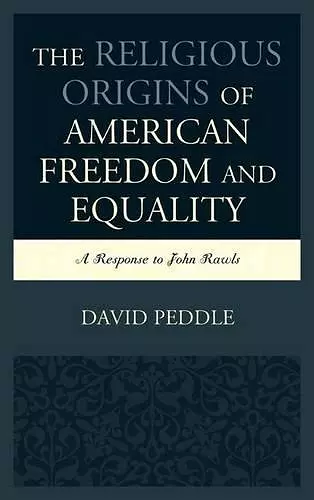The Religious Origins of American Freedom and Equality
A Response to John Rawls
Format:Paperback
Publisher:Bloomsbury Publishing PLC
Published:18th Dec '15
Currently unavailable, and unfortunately no date known when it will be back

The metaphor of a “wall of separation” between church and state obscures the substantial connection that exists between the Christian religion and American liberalism. The central thesis of this work challenges the legitimacy of this metaphor as it appears in Supreme Court decisions and in the thought of the philosopher John Rawls. The Religious Origins of American Freedom and Equality provides a provocative interpretation of the nature of Christian and liberal principles, suggesting that the principles of individual freedom and equality were forged even within the conservative elements of Calvinism and Puritanism. Recognition of this substantial intellectual connection has the potential to help reshape our conception of the separation of church and state by tempering the opposition between religious and political concepts and values.
The purpose of The Religious Origins of American Freedom and Equality then, is to contribute to an understanding of public reason that is more open to the contributions of religious perspectives. The work attempts to show how religious doctrines, currently obscured by historical context and hermeneutical dogmatism, have nonetheless played a formative role in the evolution of the freedom and equality that is foundational to contemporary liberalism. Understanding the genesis of the concepts of freedom and equality tempers the conceptual opposition between church and state and allows a clearer more inclusive interpretation of the nature of their separation.
The originality of the work is fourfold: (1) the challenge its central thesis poses to dominant constructions of public reason, freedom, and equality; (2) the interdisciplinary method through which it brings the findings of a variety of disciplines to bear on a central issues in political philosophy; (3) the challenge it brings to the analytic and pragmatic approach of contemporary liberalism through its assertion of the importance of historical context to contemporary ideas; and (4) the degree to which it engages theology in its relation to contemporary questions.
[This book is a] brief but highly informative and thoughtful criticism of the secularist perspective of John Rawls’s political liberalism. * Journal of Church and State *
A great merit of David Peddle’s The Religious Origins of American Freedom and Equality is that it avoids both extremes of the Rawls debate. . . .Peddle’s book has the virtue of reminding us of the importance that religion played in America’s most formative years. It would be perilous to go forward forgetting from whence we came and the ideas that have shaped us. Peddle does a commendable job at keeping both directions in mind and what he has to say should be taken seriously by both the friends and foes of Rawls’s political theory. * Interpretation *
David Peddle's important new book, The Religious Origins of American Freedom and Equality, is a truly remarkable contribution to contemporary political philosophy. In it, he offers a serious critique of the Rawlsian paradigm and points to a deeper and more historically grounded account of the relation of church and state in America. The account of American liberalism given by Peddle not only corrects Rawls, but it serves the broader goal of moving beyond the calcified division between the 'religious right' and the 'secular left' by suggesting a new lens through which to view the roles of church and state in contemporary America.
Rooted in a serious engagement with the seventeenth- and eighteenth- century philosophical foundations of the American regime, as well as the recognition of the religious antecedents which provided the ground for the enlightenment thinkers, Peddle demonstrates that it is possible to connect religious life with objective political forms in a way that neither is threatened or truncated. Perhaps as remarkable as the intellectual undertaking itself is Peddle's humility of expression and accessible style that belies the breadth and depth of his scholarship.
ISBN: 9780739194560
Dimensions: unknown
Weight: unknown
156 pages